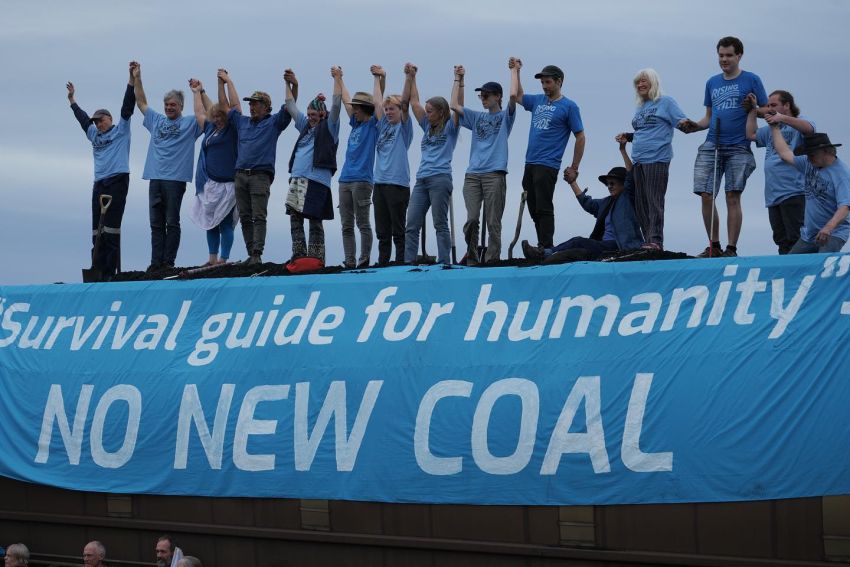
July 6, the hottest day on record, formed part of a consecutive run of 20 days scientists believe are likely to be the hottest such stretch in more than 100,000 years.
This year we also had the hottest June on record: Berkley Earth is projecting that this year will be the hottest on record.
The climate crisis is also playing out in marine heatwaves, dramatic Antarctic sea ice loss and unprecedented flooding and other “natural disasters” including the Canadian wildfires.
Physical oceanographer Edward Doddridge told the ABC that the loss of Antarctic sea ice “is a five-sigma event”, meaning that it’s five standard deviations beyond the mean. If nothing changes, he said, “we’d expect to see a winter like this about once every 7.5 million years”.
Meteorologist Scott Duncan posted on July 26 that the water temperature in the Mediterranean is “completely outside all previous records”.
“We have never measured this level of heat across the basin at any time of year. It is only July. We usually see the annual maximum in August.”
Despite some establishment media attempts (including the BBC) to question the link between these extremes and global warming, a new World Weather Attribution study found that “maximum heat like in July 2023 would have been virtually impossible to occur in the US/Mexico region and Southern Europe if humans had not warmed the planet by burning fossil fuels”.
Seeking solutions to the climate crisis means going beyond what individuals can feasibly do.
The science clearly points to the need for systemic change.
Respected climate scientist James Hansen, co-author of a July paper Global warming in the pipeline, argues that: “We should aim to return to a climate close to that in which civilization developed, in which the nature that we know and love thrived … it is still feasible to do that without passing through an irreversible disaster such as many-meter sea level rise.”
The study’s authors emphasises that this is only possible with rapid and dramatic reductions in greenhouse gas emissions.
Similarly, climate scientist Friederike Otto told the BBC that “we still have time to secure a liveable future for many”.
More than three decades after the 1992 Rio Earth Summit, no capitalist country has made any serious effort to decarbonise. Capitalism needs the support of the fossil fuel industry, and vice-versa.
We live under a ruling class willing to jeopardise our lives and those of future generations for short-term profit.
One manifestation of this phenomenon is the government’s mobilisation of resources to expand the war machine, providing weapons’ manufacturers with huge profits, rather than seriously tackle the climate crisis.
The bipartisan decision to enter the AUKUS military alliance, spend at least $368 billion on nuclear submarines and participate in the reckless war drive against China will put so many lives at risk.
We have also seen how the federal Coalition is pushing for AUKUS to become an opportunity to set up a nuclear industry in Australia. Opposition leader Peter Dutton wants nuclear power as “part of the energy mix”.
Australia has the world’s largest deposits of uranium and, even if a nuclear industry cannot be set up, pro-nuclear pundits want uranium mining expanded.
Besides not having a solution to the radioactive waste, there are many other reasons (cost, the lengthy time to commission nuclear and the violation of First Nations’ rights) to oppose nuclear power.
There is more than enough evidence that we are in the midst of a climate emergency and we need to rapidly transition to 100% renewable energy and stop mining and exporting gas and coal.
Climate activists will be demanding this and more at the protest outside Labor’s national conference in Brisbane in August. Move Beyond Coal and others have organised a climate-focused protest on August 17 and the No AUKUS Coalition has organised a protest against the military pact on August 18.
The People’s Blockade of the Newcastle coal port in November will be another opportunity to demand Labor acts for us and not the fossil fuel corporations.
This year’s actions to mark the 78th anniversary of the United States’ unnecessary use of nuclear weapons against the Japanese cities of Hiroshima and Nagasaki will also make the point that we need to fight for a safe climate, not prepare for a war with China.
As climate campaigner Bill McKibbon told the Majority Report podcast, the next 18 months is going to be critical.
“We’re right at the beginning of an El Nino warming period in the Pacific. That will be enough to keep driving already record high temperatures ever higher for the next 18 months and that will produce violent chaos and havoc in our climate system.”
[Alex Bainbridge is a member of the Socialist Alliance National Executive.]